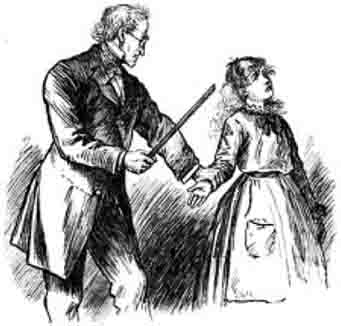 Little Women
by Louisa May Alcott
Little Women
by Louisa May Alcott
"Tell me all about it. Are limes the fashion now? It used to be pricking bits of rubber to make balls." And Meg tried to keep her countenance, Amy looked so grave and important.
"Why, you see, the girls are always buying them, and unless you want to be thought mean, you must do it too. It's nothing but limes now, for everyone is sucking them in their desks in schooltime, and trading them off for pencils, bead rings, paper dolls, or something else, at recess. If one girl likes another, she gives her a lime. If she's mad with her, she eats one before her face, and doesn't offer even a suck. They treat by turns, and I've had ever so many but haven't returned them, and I ought for they are debts of honor, you know."
* * * *
Next day Amy was rather late at school, but could not resist the temptation of displaying, with pardonable pride, a moist brown-paper parcel, before she consigned it to the inmost recesses of her desk. During the next few minutes the rumor that Amy March had got twenty-four delicious limes (she ate one on the way) and was going to treat circulated through her 'set', and the attentions of her friends became quite overwhelming. Katy Brown invited her to her next party on the spot. Mary Kingsley insisted on lending her her watch till recess, and Jenny Snow, a satirical young lady, who had basely twitted Amy upon her limeless state, promptly buried the hatchet and offered to furnish answers to certain appalling sums. But Amy had not forgotten Miss Snow's cutting remarks about 'some persons whose noses were not too flat to smell other people's limes, and stuck-up people who were not too proud to ask for them', and she instantly crushed 'that Snow girl's' hopes by the withering telegram, "You needn't be so polite all of a sudden, for you won't get any."
A distinguished personage happened to visit the school that morning, and Amy's beautifully drawn maps received praise, which honor to her foe rankled in the soul of Miss Snow, and caused Miss March to assume the airs of a studious young peacock. But, alas, alas! Pride goes before a fall, and the revengeful Snow turned the tables with disastrous success. No sooner had the guest paid the usual stale compliments and bowed himself out, than Jenny, under pretense of asking an important question, informed Mr. Davis, the teacher, that Amy March had pickled limes in her desk…
"Young ladies, attention, if you please!"
At the stern order the buzz ceased, and fifty pairs of blue, black, gray, and brown eyes were obediently fixed upon his awful countenance.
"Miss March, come to the desk."
Amy rose to comply with outward composure, but a secret fear oppressed her, for the limes
weighed upon her conscience.
"Bring with you the limes you have in your desk," was the unexpected command which arrested her before she got out of her seat.
"Don't take all." whispered her neighbor, a young lady of great presence of mind.
Amy hastily shook out half a dozen and laid the rest down before Mr. Davis, feeling that any man possessing a human heart would relent when that delicious perfume met his nose. Unfortunately, Mr. Davis particularly detested the odor of the fashionable pickle, and disgust added to his wrath.
"Is that all?"
"Not quite," stammered Amy.
"Bring the rest immediately."
With a despairing glance at her set, she obeyed.
"You are sure there are no more?"
"I never lie, sir."
"So I see. Now take these disgusting things two by two, and throw them out of the window."
There was a simultaneous sigh, which created quite a little gust, as the last hope fled, and the treat was ravished from their longing lips. Scarlet with shame and anger, Amy went to and fro six dreadful times, and as each doomed couple, looking oh, so plump and juicy, fell from her reluctant hands, a shout from the street completed the anguish of the girls, for it told them that their feast was being exulted over by the little Irish children, who were their sworn foes. This -- this was too much. All flashed indignant or appealing glances at the inexorable Davis, and one passionate lime lover burst into tears.
As Amy returned from her last trip, Mr. Davis gave a portentous "Hem!" and said, in his most impressive manner . . .
"Young ladies, you remember what I said to you a week ago. I am sorry this has happened, but I never allow my rules to be infringed, and I never break my word. Miss March, hold out your hand."
Amy started, and put both hands behind her, turning on him an imploring look which pleaded for her better than the words she could not utter. She was rather a favorite with 'old Davis', as, of course, he was called, and it's my private belief that he would have broken his word if the indignation of one irrepressible young lady had not found vent in a hiss. That hiss, faint as it was, irritated the irascible gentleman, and sealed the culprit's fate.
"Your hand, Miss March!" was the only answer her mute appeal received, and too proud to cry or beseech, Amy set her teeth, threw back her head defiantly, and bore without flinching several tingling blows on her little palm. They were neither many nor heavy, but that made no difference to her. For the first time in her life she had been struck, and the disgrace, in her eyes, was as deep as if he had knocked her down.
"You will now stand on the platform till recess," said Mr. Davis, resolved to do the thing thoroughly, since he had begun.
That was dreadful. It would have been bad enough to go to her seat, and see the pitying faces of her friends, or the satisfied ones of her few enemies, but to face the whole school, with that shame fresh upon her, seemed impossible, and for a second she felt as if she could only drop down where she stood, and break her heart with crying. A bitter sense of wrong and the thought of Jenny Snow helped her to bear it, and, taking the ignominious place, she fixed her eyes on the stove funnel above what now seemed a
sea of faces, and stood there, so motionless and white that the girls found it hard to study with that pathetic figure before them.
During the fifteen minutes that followed, the proud and sensitive little girl suffered a shame and pain which she never forgot. To others it might seem a ludicrous or trivial affair, but to her it was a hard experience, for during the twelve years of her life she had been governed by love alone, and a blow of that sort had never touched her before. The smart of her hand and the ache of her heart were forgotten in the sting of the thought, "I shall have to tell at home, and they will be so disappointed in me!"
The fifteen minutes seemed an hour, but they came to an end at last, and the word 'Recess!' had never seemed so welcome to her before.
****
"Yes, you can have a vacation from school, but I want you to study a little every day with Beth," said Mrs. March that evening. "I don't approve of corporal punishment, especially for girls. I dislike Mr. Davis's manner of teaching and don't think the girls you associate with are doing you any good, so I shall ask your father's advice before I send you anywhere else."
"That's good! I wish all the girls would leave, and spoil his old school. It's perfectly maddening to think of those lovely limes," sighed Amy, with the air of a martyr.
"I am not sorry you lost them, for you broke the rules, and deserved some punishment for disobedience," was the severe reply, which rather disappointed the young lady, who expected nothing but sympathy.
"Do you mean you are glad I was disgraced before the whole school?" cried Amy.
"I should not have chosen that way of mending a fault," replied her mother, "but I'm not sure that it won't do you more good than a milder method. You are getting to be rather conceited, my dear, and it is quite time you set about correcting it. You have a good many little gifts and virtues, but there is no need of parading them, for conceit spoils the finest genius. There is not much danger that real talent or goodness will be overlooked long, even if it is, the consciousness of possessing and using it well should satisfy one, and the great charm of all power is modesty."

